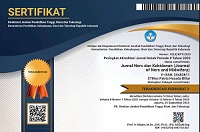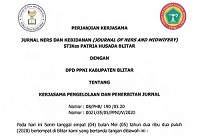Systematic Review : Immunoglobulin Concentration in Breast Milk as a Body Defense against Sars-Cov-2
DOI:
https://doi.org/10.26699/jnk.v8i2.ART.p255-262Keywords:
Immunoglobulin, Breast Milk, SARS-CoV-2Abstract
The largest cases of pneumonia occurred in Wuhan City, Hubei Province of China in December 2019, which resembles SARS-CoV as a cause of SARS (Severe Acute Respiratory Syndrome) virus infection. The number of cases reaches 3.2 million people worldwide, and among them are breastfeeding mothers. Although virus transmission occurs through direct contact with infected patients, the number of infants or young children who were infected with COVID-19 during breastfeeding was only 10%. There is no scientific evidence for vertical transmission from mother to her baby during pregnancy and breastfeeding. The content of immunoglobulin A (IgA), immunoglobulin M (IgM), and immunoglobulin G (IgG) has a positive impact on the infant’s body. The objective of the study was to determine the immunoglobulin concentration in breast milk against SARS CoV2. The method used a systematic review approach with the design of Preferred Reporting Items For Systematic Reviews & Meta-Analyses (PRISMA). The result showed laboratory clinical trials, the IgA, IgG, and IgM responses showed good results in the spread of the coronavirus into the baby's body. IgA reactivity has a higher concentration than other cells. In conclusion, Covid-19 pandemic made the public worried about their health, including breastfeeding mothers. The role of health workers is needed to provide information related to breastfeeding exclusively to their babies so that they will receive protection against virus entered their bodies. Suggestion: It is necessary to develop studies regarding the typical responses that come up from IgA, IgM, IgG and are able to protect infants from Covid-19 and vertical transmission between mother and her baby during pregnancy to breastfeeding.References
Alisa Fox, Jessica Marino, Fatima Amanat, et al. (2020). Evidence of a significant secretory-IgA-dominant SARS-CoV-2 immune response in human milk following recovery from COVID-19. BMJ, doi.org/10.1101/2020.05.04.20089995
An Tang, Zhen-dong Tong, Hong-ling Wang, et.all. (2020). Detection of Novel Coronavirus by RT-PCR in Stool Specimen from Asymptomatic Child, China. Emerging Infectious Diseases, doi: 10.3201/eid2606.200301
Guan W, Ni Z, Hu Y, Liang W, Chun-quan O, Jianxing H. et al. (2020). Clinical Characteristics of Coronavirus Disease 2019 in China. N Engl J Med, doi: 10.1056/NEJMoa2002032 19.
Huaping Zhu, Lin Wang, Chengzhi Fang, et.all. (2020). Clinical analysis of 10 neonates born to mothers with 2019-nCoV pneumonia. Transl Pediatr, doi: 10.21037/tp.2020.02.06
Hoffmann M, Kleine-Weber H, Schroeder S, Kru ̈ ger N, Herrler T, Erichsen , et all. (2020). SARS-CoV-2 Cell Entry Depends on ACE2 and TMPRSS2 and Is Blocked by a Clinically Proven Protease Inhibitor. Cell 181, 271–280
Imai Y, Kuba K, Rao S, Huan Y, Guo F, Guan B, et all. (2005). Angiotensin-converting enzyme 2 protects from severe acute lung failure. Nature, hal 436
Jaimes JA, André NM, Chappie JS, Millet JK and Whittaker GR. (2020). Phylogenetic Analysis and Structural Modeling of SARS-CoV-2 Spike Protein Reveals an Evolutionary Distinct and Proteolytically Sensitive Activation Loop. J Mol Biol, doi: 10.1016/j.jmb.2020.04.009
Jia HP, Look DC, Shi L, Hickey M, Pewe L, Netland J, et all. (2005). ACE2 Receptor Expression and Severe Acute Respiratory Syndrome Coronavirus Infection Depend on Differentiation of Human Airway Epithelia. J Virol. Vol (79), no (23), hal (14614–14621), doi: 10.1128/JVI.79.23.14614-14621
Li W, Zhang C, Sui J, Kuhn JH, Moore MJ, Luo S. (2005). Receptor and viral determinants ofSARScoronavirus adaptation to human ACE2. The EMBO Journal, vol (24), hal (1634–1643)
Lia Amalia,1 Irwan2 Febriani Hiola. (2020). Analisis Gejala Klinis Dan Peningkatan Kekebalan Tubuh Untuk Mencegah Penyakit Covid-19. Jambura Journal of Health Sciences and Research, vol (2), no (2)
Lovato A and de Filippis C. (2020). Clinical Presentation of COVID-19: A Systematic Review Focusing on Upper Airway Symptoms. Ear, Nose & Throat Journal, doi.org/10.1177/0145561320920762
M. Permanyer C, Castellote C, RamÃrez-Santana, et.al. (2010). Maintenance of breast milk immunoglobulin A after high-pressure processing. J. Dairy Sci, doi: 1 0.3168/jds.2009-2643
Mehta P, McAuley DF, Brown M, Sanchez E, Tattersall RS, Manson JJ, et all. (2020). COVID-19: consider cytokine storm syndromes and immunosuppression. The Lancet Health Longevity, doi.org/10.1016/S01406736(20)30628-0
Na Zhu, Ph.D., Dingyu Zhang, M.D., Wenling Wang, et.all. (2020). A Novel Coronavirus from Patients with Pneumonia in China, 2019. The new england journal of medicine, doi: 10.1056/NEJMoa2001017
Nicole Theresa Cacho and Robert M Lawrence. (2017). Innate Immunity and Breast Milk. Front Immunol, doi: 10.3389/fimmu.2017.00584
Patricia Palmeira and Magda Carneiro Sampaio. (2016). Immunology of breast milk. SciElo, doi.org/10.1590/1806-9282.62.06.584
Sun CB, Wang Y, Liu GH, and Liu Z. (2020). Role of the Eye in Transmitting Human Coronavirus: What We Know and What We Do Not Know. Front Public Health, doi: 10.3389/fpubh.2020.00155
Sri Sumarni. (2020). Kerja Harmoni Zat Gizi dalam Meningkatkan Imunitas Tubuh Terhadap Covid-19: Mini Review. IAGIKMI & Universitas Airlangga, doi: 10.2473/amnt.v4i3.2020. 250-256
Susi Hartati, Nani Nurhaeni dan Dewi Gayatri. (2012). Faktor Resiko Terjadinya Pneumonia pada Anak Balita. Jurnal Keperawatan Indonesia, vol (15), no (1), hal (13-20)
Tai W, He Lei, Zhang X, Pu J, Voronin D, Jiang S, et all. (2020). Characterization of the receptor-binding domain (RBD) of 2019 novel coronavirus: implication for development of RBD protein as a viral attachment inhibitor and vaccine. Cell Mol Immunol, https://www.nature.com/articles/s41423-0200400-4.
Wiwin W, Suryani S, Munayarokh, Anies, Liliana NK, Diyan W et.al. (2016). Speos (Endorphins And Oxytocin Stimulation Massage And Suggestive Provisions) Reduced In The Time Of Asi Production Between The Postpartum Mother In The Private Bidan. 4 Asian Academic Society International Conference (AASIC)






